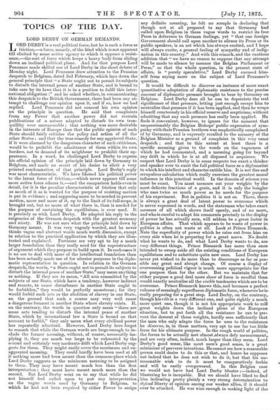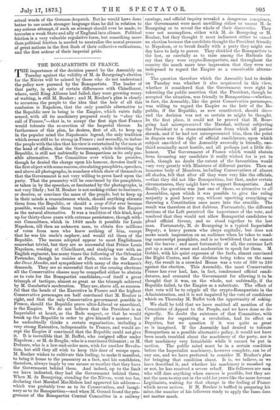TOPICS OF THE DAY.
LORD DERBY ON GERMAN DEMANDS.
TORD DERBY is a real political force, but he is such a force as friction,—a force, namely, of the kind which is not apparent till elicited by some active agency to which it opposes a resist- ance,—the sort of force which keeps a heavy body from sliding down an inclined political plane. And for that purpose Lord Penzance made skilful use of Lord Derby in the short debate of Monday night. Lord Penzance drew attention to the Prussian despatch to Belgium, dated 3rd February, which lays down the general principle that "a State ought not to permit its subjects to disturb the internal peace of another State, and is bound to take care by its laws that it is in a position to fulfil this inter- national obligation ;" and he asked whether, in communicating this despatch to the British Government, there had been any at- tempt to challenge our opinion upon it, and if so, how we had replied. Lord Penzance did not conceal his own opinion on the principle in question. He said that complaints from any Power that another power did not restrain publications of a nature adapted to disturb its own tran- quillity were unreasonable ; that nothing was more desirable in the interests of Europe than that the public opinion of each State should fairly criticise the policy and action of all the other States ; and that the true remedy for any aggrieved State, if it were alarmed by the dangerous character of such criticisms, would be to prohibit the admittance of them within its own borders, not to demand of its neighbour to prohibit their ap- pearance. In a word, he challenged Lord Derby to express his official opinion of the principle laid down by Germany to Belgium, and made no secret of his desire to elicit a very pointed condemnation of that principle. Lord Derby's reply was most characteristic. We have likened his political power to the latent force of friction,—which never appears till some more active force educes it,—and the comparison holds even in detail, for it is the peculiar characteristic of friction that only as much of it as is wanted for the purpose of resisting motion is put in evidence ; and supposing more to be needed to prevent motion, more and more of it, up to the limit of its full scope, is brought out, but no more of what there is, than is needed for the purpose of sustaining the equilibrium, is ever used. It is precisely so with Lord Derby. He adapted his reply to the exigencies of the German despatch with the greatest economy and nicety. He was not sure what the principle laid down by Germany meant. It was very vaguely worded, and he never thinks vague and abstract words much worth discussion, except in relation to the practical application by which they are illus- trated and explained. Partisans are very apt to lay a much larger foundation than they really need for the superstructure of argument which they purpose to build upon it. In such cases it is no use to deal with more of the intellectual foundation than has been actually made use of for ulterior purposes in the diplo- matic representation in question. In relation to the German despatch, the words, "a State ought not to permit its subjects to disturb the internal peace of another State," may mean anything or nothing. If they are to mean, "All acts committed by the subjects of one State, which have a tendency, however indirect and remote, to cause disturbance in another State ought to be forbidden," they would be perfectly monstrous ; for they would forbid such acts as the abolition of slavery in one State, on the ground that such a course may very well cause a dangerous ferment in another State where slavery exists. If, on the contrary, the words in question only mean "there are some acts tending to disturb the internal peace of another State, which by international law a State is bound on that account to forbid," they only mean what every civilised power has repeatedly admitted. However, Lord Derby here forgot to remark that while the German words are large enough to in- clude the former meaning, without, of course, necessarily im- plying it, they are much too large to be exhausted by the second and certainly very moderate drift which Lord Derby sug- gests for them. They might easily cover the maximum and ex- aggerated meaning. They could hardly have been used at all if nothing more had been meant than the common-place which Lord Derby suggests as the minimum meaning to be assigned to them. They may have meant much less than the first interpretation ; they must have meant much more than the second. But Lord Derby went on to say that while he did not himself feel called upon to put any interpretation on the vague words used by Germany to Belgium, to which he had not been required by either Power to assign
any definite meaning, he felt no scruple in declaring that though not at all prepared to say that Germany had called upon Belgium in these vague words to restrict its free Press in deference to German feelings, yet "that one foreign Government should call upon another to silence its Press or its public speakers, is an act which has always excited, and I hope will always excite, a general feeling of sympathy and of indig- nation in this country." And with this remark, and the cautious addition that "we have no reason to suppose that any attempt will be made to silence by menace the Belgian ktaliament or Press," so that the whole question, in the present state of affairs, is "purely speculative," Lord Derby excused him- self from saying more on the subject of Lord Penzance's question.
It would be difficult to discover an instance of more exact quantitative adaptation of diplomatic resistance to the precise amount of diplomatic pressure brought to bear by Germany on Belgium. Lord Derby does all he can to depreciate the real significance of that pressure, letting just enough escape him to neutralise that pressure if it has been applied, and then he wraps himself courteously in his official reserve and scepticismovithout admitting that any such pressure has really been applied. Ha finds it convenient, however, to ignore for the moment that unquestionably the Belgian Bishops' public expression of sym- pathy with their Prussian brethren was emphatically complained of by Germany, and is expressly recalled to the memory of the Belgian Minister as a ground of complaint in this very same- despatch ; and that to this extent at least there is a, specific meaning given to the words on the vagueness of' which he had commented, and a meaning going far beyond any drift in which he is at all disposed to acquiesce. We suspect that Lord Derby is in some respects too exact a thinker and speaker ever to exert the full political force as a diplomatist to which his intellect and character entitle him. It is not fine and scrupulous calculation which really exercises the greatest moral influence in this practical world. In the domain of science you, must be exact. You must measure out your weights by the most delicate fractions of a grain, and it is only the bungler who uses twice as much power as he needs for the purpose of his experiment. But in politics it is not so. There, there is always a great deal of latent power to overcome which is never expressed in words, and the statesman who takes exact measure of all which shows itself openly, and of no more,, and who is careful to adapt his comments precisely to the display of power he has actually seen, will seldom be a great factor in European affairs. That which appears to be waste of power in politics is often not waste at all. Look at Prince Bismarck.. Note the superfluity of power which he rains out from him on every side when he is preparing for a great move. No doubt what he wants to do, and what Lord Derby wants to do, are very different things. Prince Bismarck has more than once, intended to sweep aside all the existing conditions of European equilibrium and to substitute quite new ones. Lord Derby has never yet wished to do more than to discourage as far as pos- sible any great and abrupt change. Of course a display of overweening political vigour is much more appropriate for the one purpose than for the other. But we maintain that for either purpose a good deal more show of force is needful than would exactly neutralise all the visible tendencies which are to be overcome. Prince Bismarck knows this, and becomes a perfect. volcano of seemingly superfluous diplomatic force, wheneverhe is really preparing for a great step. Lord Derby, on the contrary,. though his ride is a very different one, and quite rightly a much more quiet one, though it is not his appropriate work to roll great weights down the inclined plane of the European situation, but to put forth all the resistance he can to pre- vent the descent of those weights, hardly sees sufficiently that the man who only adapts the force he uses to the resistance he discerns, is, in these matters, very apt to use far too little force for his ultimate purpose. In the rough world of politics, the forces to be actually met almost .always defy measurement„ and are very often, indeed, much larger than they seem. Lord Derby's good sense, like most men's good sense, is a great minimiser of perverse intentions. He cannot see how a reasonable person could desire to do this or that, and hence he supposes not indeed that he does not wish to do it, but that his un- reasonable wish to do it must be comparatively feeble and will be easily overpowered. In this Belgian case we would not have had Lord Derby bluster ;—indeed, of blustering he is incapable. But we should have liked to find him indicating pretty plainly a very strong determination -to defend liberty of opinion among our weaker allies, if it should ever be attacked. He was wise enough in making light of the actual words of the German despatch. But he would have done better to use much stronger language than he did in relation to any serious attempt, if such an attempt should ever be made, to terrorise a weak State and ally of England into silence. Political friction is a very valuable regulative force, but something more than political friction is needed to neutralise the moral pressure of great nations in the first flush of their collective enthusiasm, and the first ardour of their imperial pride.



































 Previous page
Previous page